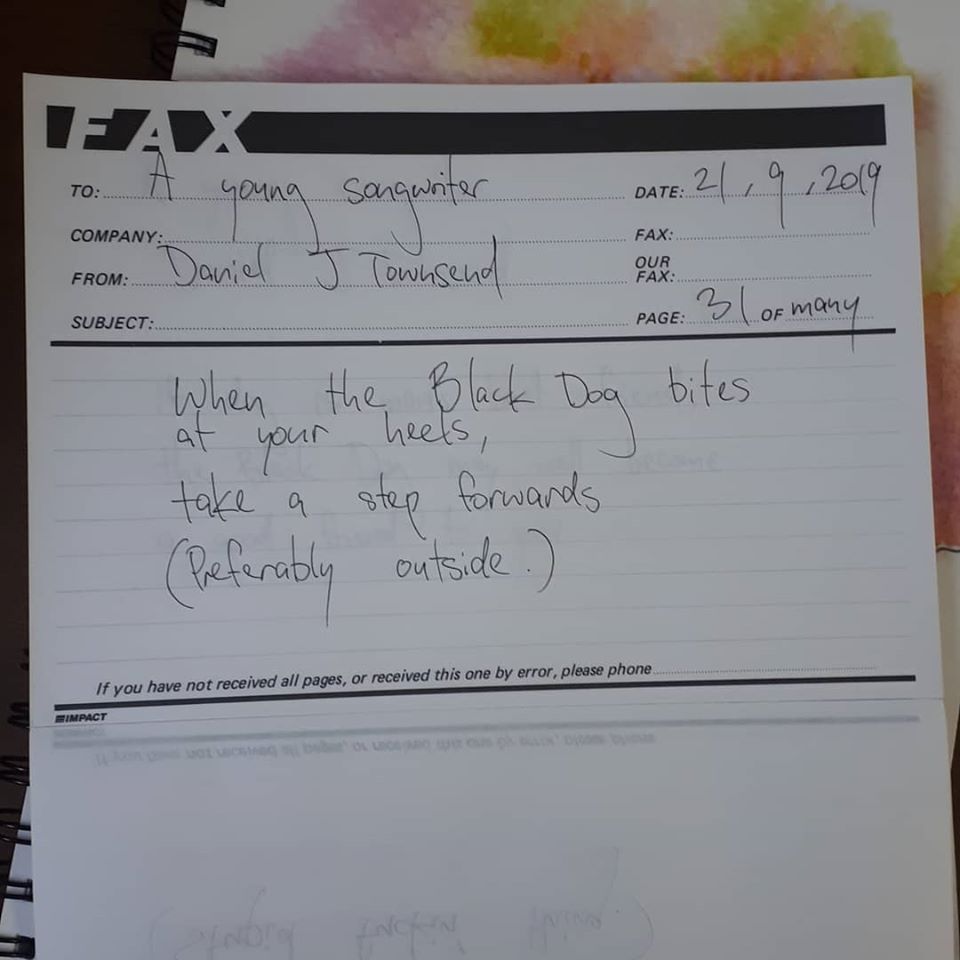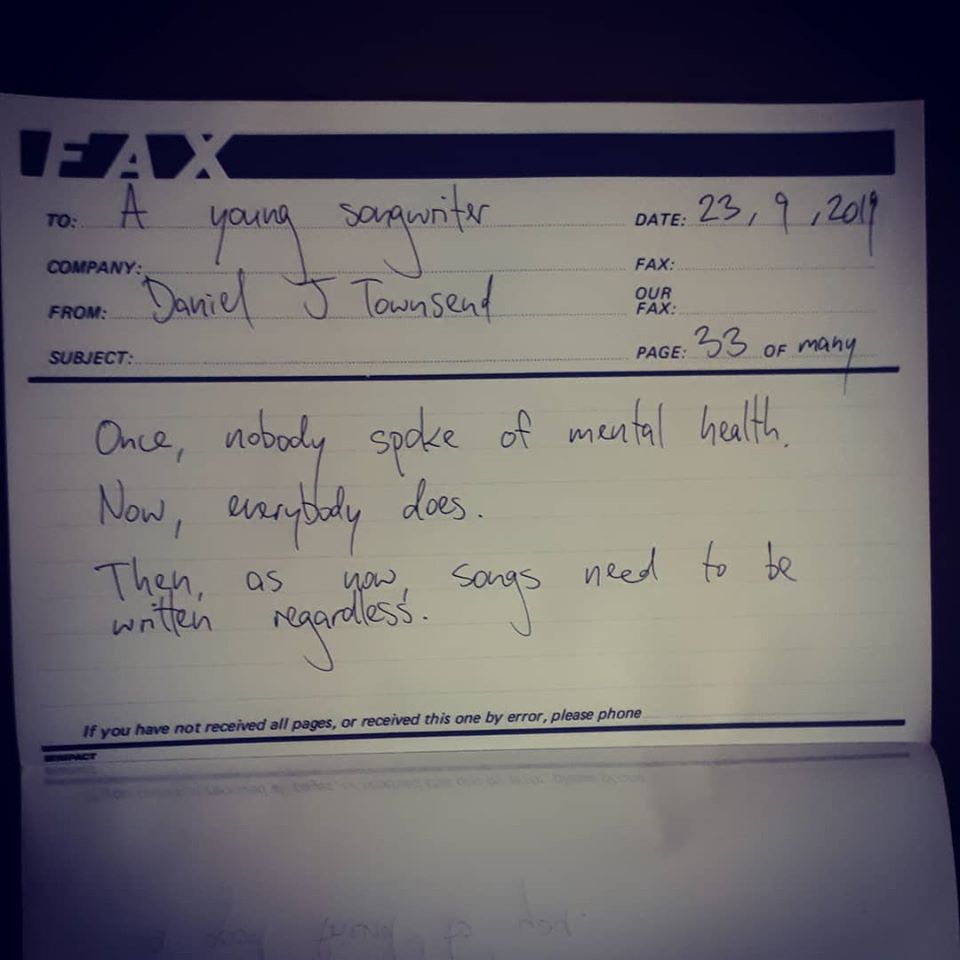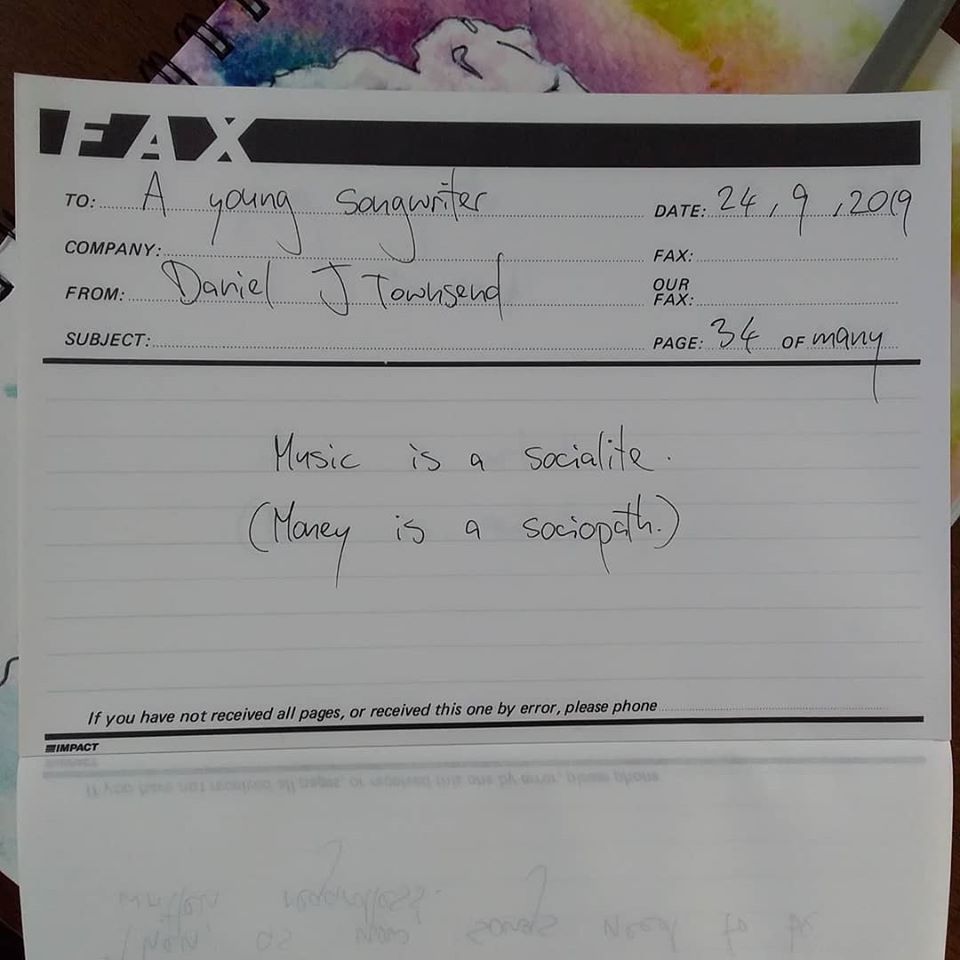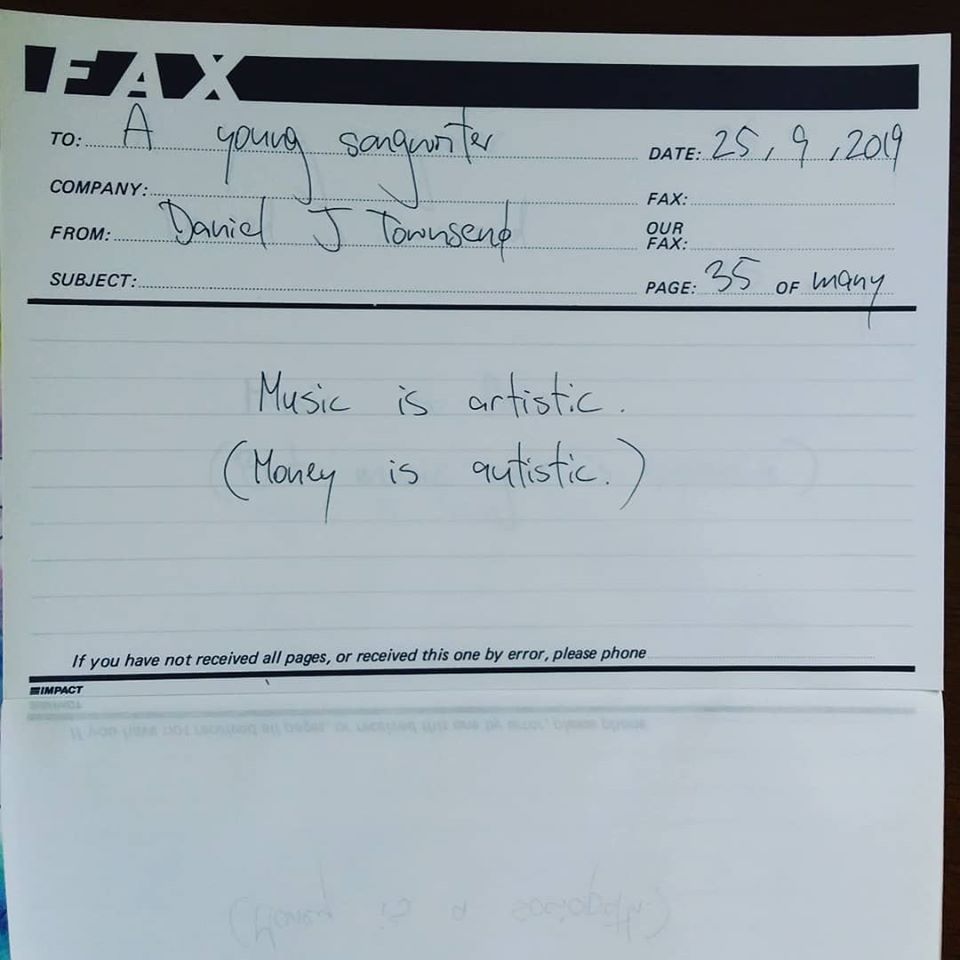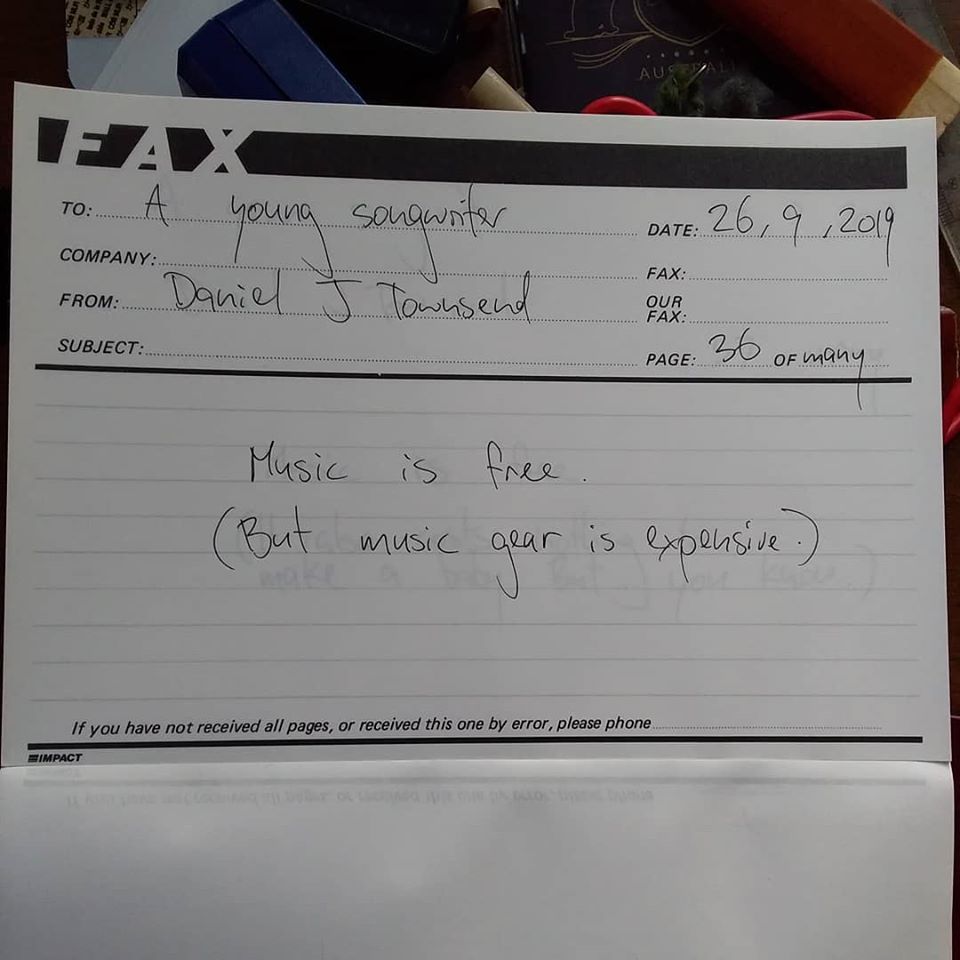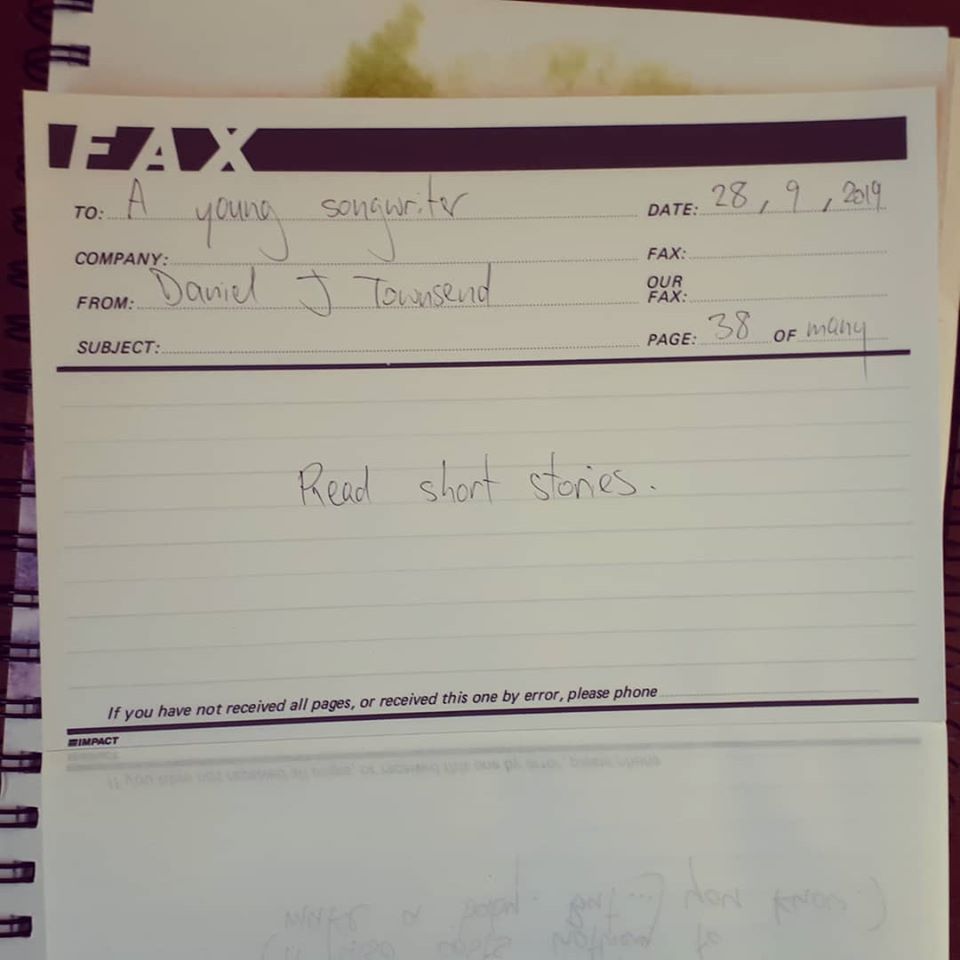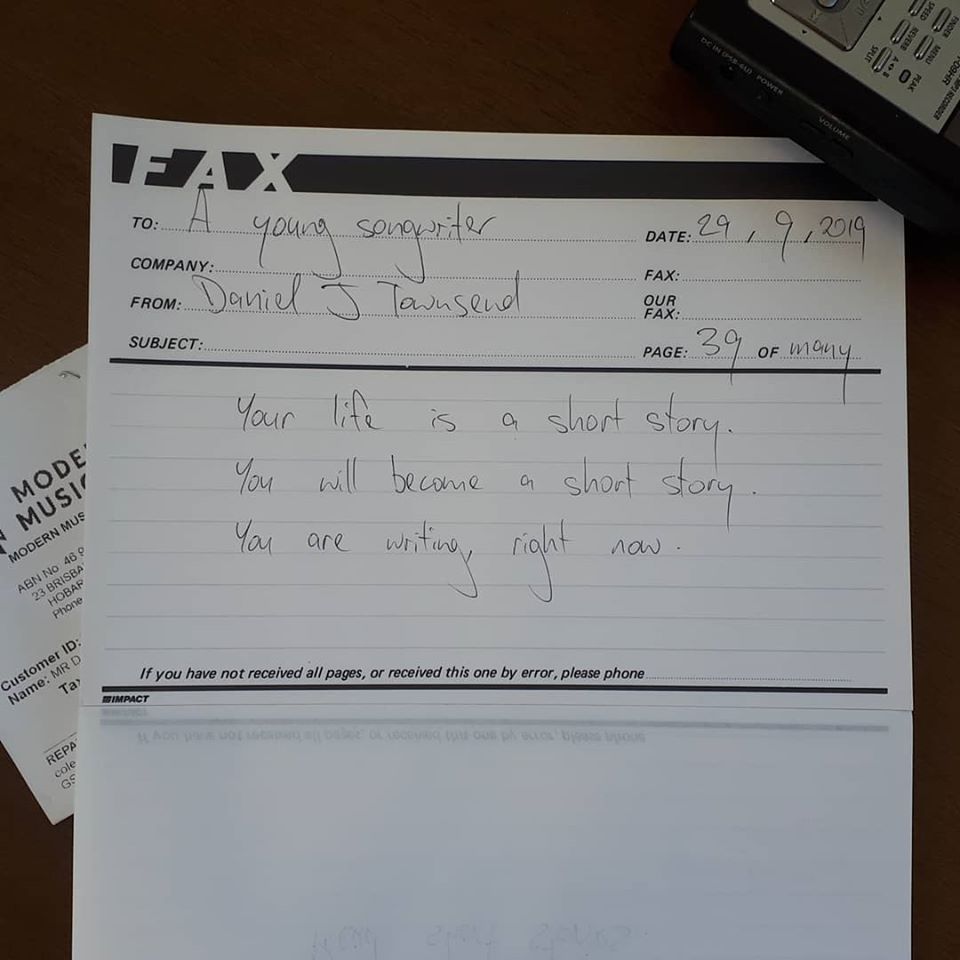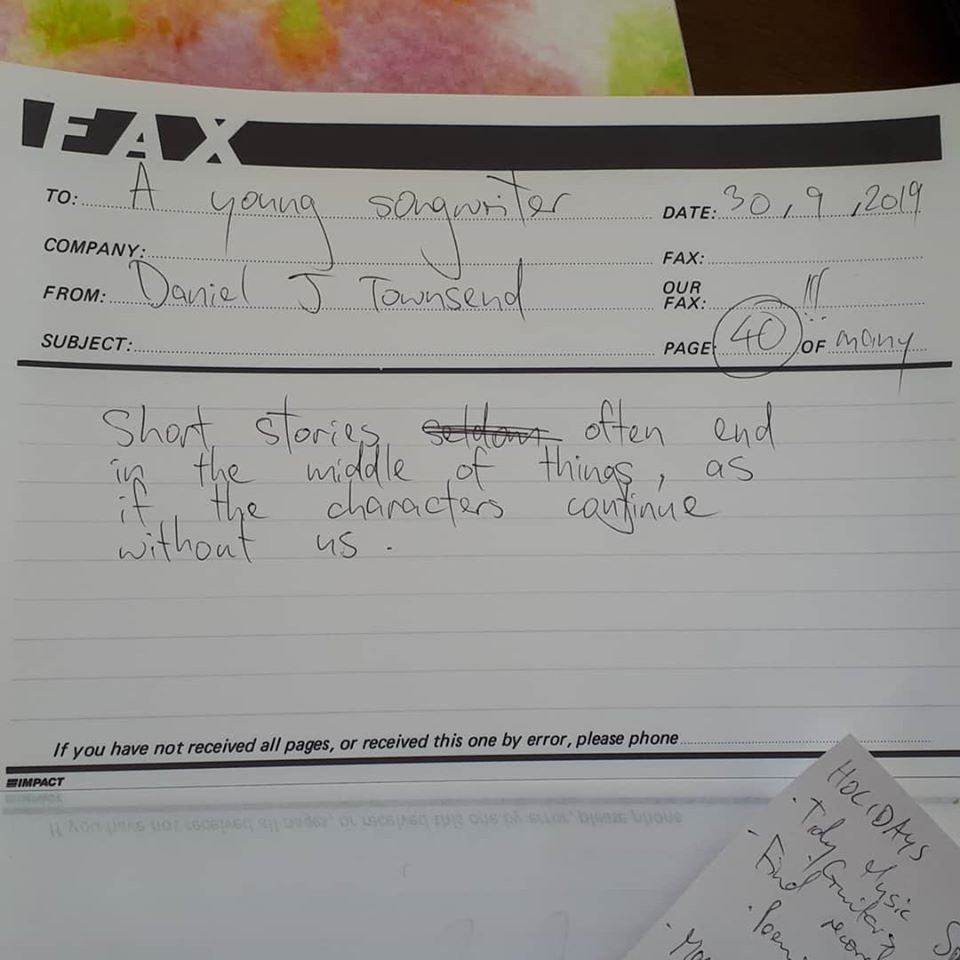I lay in bed
As one who fills a coffin or nurses their head
Within white hospital walls,
Waiting for the strains of a song from heart to brain
I watched the air
Twist and dance above me
Like a startled fire flares and then subdues to a dance, then to embers that glow,
But no fire was in me at all
I made no sound
But I listened to the empty silence
Until I find that I could not move
So I journeyed through the space between my belly and my face
Nothing was inside
The darkness went forever at the speed of light
I thought that I would see pin-prick holes in heaven's silken floor
But the lights they shone no more
She came to me from somewhere nearer earth and sent out the call:
"I don't understand. You have all that you desired. Why are you so paralysed?"
The man of medicine
With his bag of pills and promise, with the eyes of a friend said,
"I've swam the depths, always going down when all the world was coming up for air.
Fourteen years you have laid in bed, ears filling with tears,
You have turned the fire to a song,
The night to a friend,
I bid you,
Come back to life again."
(From On My Death and Resurrection - me)
As one who fills a coffin or nurses their head
Within white hospital walls,
Waiting for the strains of a song from heart to brain
I watched the air
Twist and dance above me
Like a startled fire flares and then subdues to a dance, then to embers that glow,
But no fire was in me at all
I made no sound
But I listened to the empty silence
Until I find that I could not move
So I journeyed through the space between my belly and my face
Nothing was inside
The darkness went forever at the speed of light
I thought that I would see pin-prick holes in heaven's silken floor
But the lights they shone no more
She came to me from somewhere nearer earth and sent out the call:
"I don't understand. You have all that you desired. Why are you so paralysed?"
The man of medicine
With his bag of pills and promise, with the eyes of a friend said,
"I've swam the depths, always going down when all the world was coming up for air.
Fourteen years you have laid in bed, ears filling with tears,
You have turned the fire to a song,
The night to a friend,
I bid you,
Come back to life again."
(From On My Death and Resurrection - me)
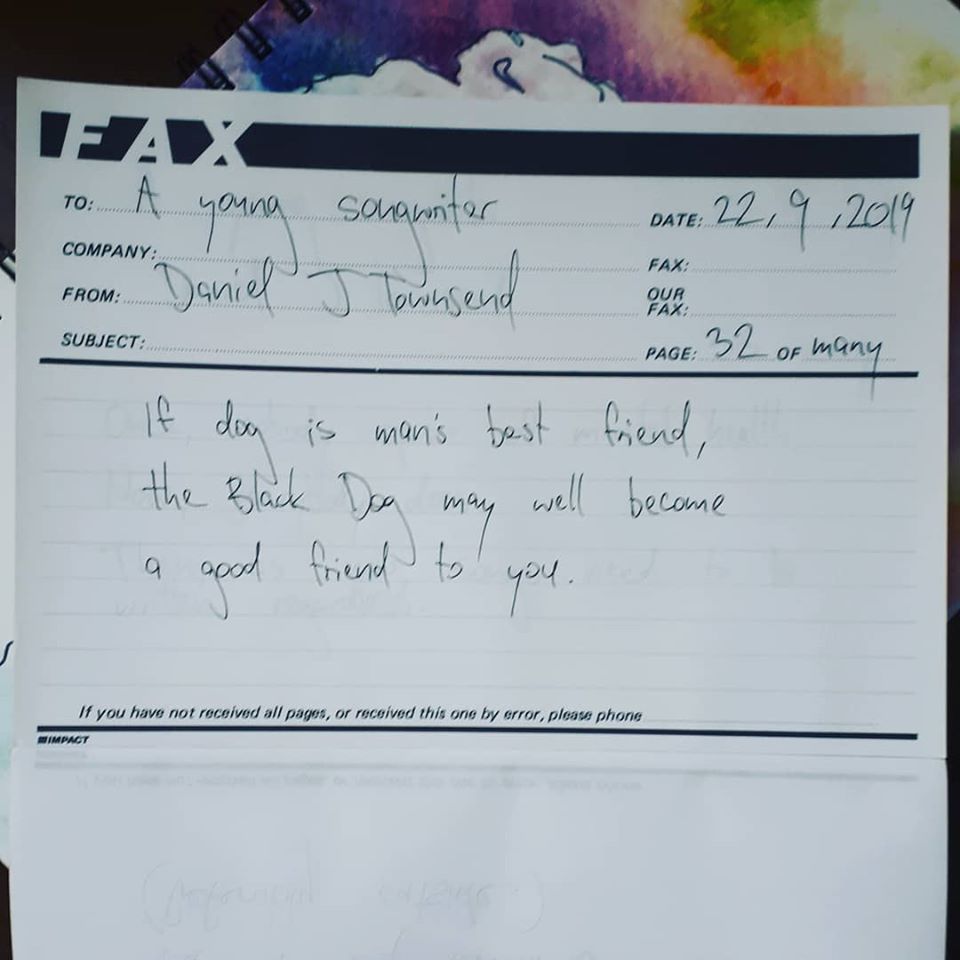
If it wasn't for that night hound, I would never get around to creating anything.
He needs a walk every day. He needs to know I'm in charge or he chews on my boots, then my toes, then my ankles. He will dig up the garden I have planted if I leave him to himself. So I take him for a midnight walk from one end of Westbury to the other.
This morning he sleeps at my feet.
He needs a walk every day. He needs to know I'm in charge or he chews on my boots, then my toes, then my ankles. He will dig up the garden I have planted if I leave him to himself. So I take him for a midnight walk from one end of Westbury to the other.
This morning he sleeps at my feet.
Once, songwriters didn't seem to have mental health problems. They just drank onstage and wrote lyrics like "the piano has been drinking, not me" (Tom Waits) or "I need an intervention but no one's got the guts" (The Whitlams) or "I drink much more than I ought to drink" (Nina Simone). Didn't seem so obvious at the time.
Sometimes they would name it: "Manic depression is touching my soul" (Hendrix), in Zeppelin's Black Dog or in every blues song, but there was always reference to the glories of self-medicating. (Something-and-something and rock n roll...)
Nowadays it's almost obligatory for young songwriters to confess that they are "struggling with" or "suffering from" one disorder or another, usually anxiety or depression. I dig it. Throw some light on that shade. You don't have to be sick to get better.
But you do have to write that song. So make a start.
Sometimes they would name it: "Manic depression is touching my soul" (Hendrix), in Zeppelin's Black Dog or in every blues song, but there was always reference to the glories of self-medicating. (Something-and-something and rock n roll...)
Nowadays it's almost obligatory for young songwriters to confess that they are "struggling with" or "suffering from" one disorder or another, usually anxiety or depression. I dig it. Throw some light on that shade. You don't have to be sick to get better.
But you do have to write that song. So make a start.
The Greek god of money is Plutus. Some say he is blind and lame, with wings so he can bugger off quickly. In one story he regains his sight and rages against the world when he realises who has cash and who doesn't. In another story he declares that he is not sent by Zeus but by Hades, god of the underworld. In Dante's Inferno, the god of money is actually the demon of wealth who guards the fourth circle of Hell, where all the hoarders and the wasters are.
The Greek god of music is also the god of poetry and archery and the sun and light and dance and truth and healing. He is the protector of young people. He invented string music. His sister is a hunter.
The Greek god of music is also the god of poetry and archery and the sun and light and dance and truth and healing. He is the protector of young people. He invented string music. His sister is a hunter.
Autism is characterised by difficulty in social interaction and by restricted or repetitive patterns of thought and behaviour. Some folks are born with it, but a lot of us kinda learn to live this way; socially limited and stuck in thought loops.
In western culture, almost everyone lives this way. Social interaction is to determine if you can use the other person to get cash or if they are likely to cost you cash. Or social capital or street cred or whatever.
There is a scene in Inside Llewyn Davis when Llewyn performs a heart breaking rendition of Queen Anne for a folk music industry giant. The song ends, fades into silence and the guy says "I don't see a lot of money here." He's right. But that doesn't mean the song or the singer is worthless.
You and your songs are very, very valuable.
In western culture, almost everyone lives this way. Social interaction is to determine if you can use the other person to get cash or if they are likely to cost you cash. Or social capital or street cred or whatever.
There is a scene in Inside Llewyn Davis when Llewyn performs a heart breaking rendition of Queen Anne for a folk music industry giant. The song ends, fades into silence and the guy says "I don't see a lot of money here." He's right. But that doesn't mean the song or the singer is worthless.
You and your songs are very, very valuable.
Once there was a young man who had something growing inside of him. Nobody was certain what it was, but everybody agreed it had to come out.
After much searching, he ended up emptying his bank account. He had to travel far away to an expert in a purpose-built room with purpose-built equipment. The expert had done this kind of thing many times before, but even he wasn't sure what this thing was.
After a very long time, the thing was out and the young man was happy. He released it on vinyl, to make it even more special.
After much searching, he ended up emptying his bank account. He had to travel far away to an expert in a purpose-built room with purpose-built equipment. The expert had done this kind of thing many times before, but even he wasn't sure what this thing was.
After a very long time, the thing was out and the young man was happy. He released it on vinyl, to make it even more special.
Sleep deprivation, man. The quickest way to insanity, I'm sure. Babies will make you lose. Your. Mind.
Once, after a million nights without a pepper sleep, rocking my daughter to sleep for the third time that particular night, I lay her down, took one step away and she lost it all over again. I punched a hole in a wall. The next day I covered it with a family portrait from happier times. (Evil little thing.)
Another time she screamed so much I ended up wrapping her tight, so she wouldn't roll over onto her sweet, agonised face, and just walked into the back yard to stare at the big, fat, stupid fuckin moon.
Then there was the time I was shaken awake by my wife, who was saying, "Daniel. The baby's crying." I could hear the screams. I asked where the baby was, as I got ready to stand up from the couch. She was in my arms, crying her eyes out. I'd fallen asleep with her, at some point.
A music-dad friend of mine once told me you haven't parented until you've seriously considered throwing your child out a window.
I guess my point is that it's fun (and free) to make a baby, but it costs a lot to make an adult. Or maybe it's something about us songwriters needing to contrast that rare and blessed moment of creative inspiration with the million moments of hard work. I dunno. I'm tired.
Once, after a million nights without a pepper sleep, rocking my daughter to sleep for the third time that particular night, I lay her down, took one step away and she lost it all over again. I punched a hole in a wall. The next day I covered it with a family portrait from happier times. (Evil little thing.)
Another time she screamed so much I ended up wrapping her tight, so she wouldn't roll over onto her sweet, agonised face, and just walked into the back yard to stare at the big, fat, stupid fuckin moon.
Then there was the time I was shaken awake by my wife, who was saying, "Daniel. The baby's crying." I could hear the screams. I asked where the baby was, as I got ready to stand up from the couch. She was in my arms, crying her eyes out. I'd fallen asleep with her, at some point.
A music-dad friend of mine once told me you haven't parented until you've seriously considered throwing your child out a window.
I guess my point is that it's fun (and free) to make a baby, but it costs a lot to make an adult. Or maybe it's something about us songwriters needing to contrast that rare and blessed moment of creative inspiration with the million moments of hard work. I dunno. I'm tired.
One of my favorite short stories is 330 words long and it opens with the line, "They got married early."
The phrase is from Paul Kelly's 'To Her Door,' a song which has passed through your ears so many times you probably don't even hear it any more, but these four words are enough to tell a whole story. And you've probably written the story in your head already, without even knowing it.
Who are they? Why did they get married early? What did her mother say about it? What sort of work does he do? What about her? Where are they from? How did they meet? What sort of shoes is he wearing? Does he wear a watch? Why? What sort of place do they live in? Does he drive? What sort of car?
If you've seen the video, some of those images have robbed you of your imagination. What if the story is set not far from you? What if it all happened about two years ago?
And, if it's true that we always write about ourselves, can you put yourself into the story? Paul Kelly got married, had no money, had a music career going nowhere, picked up a drug habit and ended up on a bus from St Kilda to Kings Cross. Doesn't mean it's him in the story, but it does mean he knows those characters front to back.
Make your point and make it quickly. Evoke a powerful emotional response in your listeners, each of whom is writing the rest of the story in their own mind. Go.
The phrase is from Paul Kelly's 'To Her Door,' a song which has passed through your ears so many times you probably don't even hear it any more, but these four words are enough to tell a whole story. And you've probably written the story in your head already, without even knowing it.
Who are they? Why did they get married early? What did her mother say about it? What sort of work does he do? What about her? Where are they from? How did they meet? What sort of shoes is he wearing? Does he wear a watch? Why? What sort of place do they live in? Does he drive? What sort of car?
If you've seen the video, some of those images have robbed you of your imagination. What if the story is set not far from you? What if it all happened about two years ago?
And, if it's true that we always write about ourselves, can you put yourself into the story? Paul Kelly got married, had no money, had a music career going nowhere, picked up a drug habit and ended up on a bus from St Kilda to Kings Cross. Doesn't mean it's him in the story, but it does mean he knows those characters front to back.
Make your point and make it quickly. Evoke a powerful emotional response in your listeners, each of whom is writing the rest of the story in their own mind. Go.
"Tom Roberts: Artist" - Tom Roberts' tombstone
The best stories are written in the mind of the reader after the book is closed.
"Would they have a future? Would he know his children? Could he paint a picture and get them all to fit?" Paul Kelly again. We each think we know how this story ends because we have never spoken it aloud. It's an uptempo song in a major key, so it feels optimistic. We hope. We want to believe.
But what do we know about these two? The guy "started up his drinking," which sounds to me like he has done this before. It's "his drinking." He owns it, or more likely it owns him. He spends a year at The Buttery, a rehab clinic in New South Wales. That's a big deal. I wonder how many of the Twelve Steps he did. Did he admit he was powerless against alcohol and that his life had become unmanageable? That's the first one. Or did he just sit in a circle once a week with arms folded, silently blaming everyone else? We're hopeful.
We'd like to hope he's better, just like she does, but his letter is not an apology. He just says "I wanna see ya." We'd like to hope there's more to it, but that's all we're given. She's found "a little bar work" and seems to have been employed for "about a year." She sends him money for the bus fare.
Why doesn't he get "a little bar work" and raise his own fare? Because that's how us Australians do it. The woman does all the work and the man just needs to turn up and not hit people. It's always a free ride for us blokes. On Olympic. It's bullshit and we need to grow up. Raise your own bus fare. And don't expect her to give you her home address.
"Would they have a future? Would he know his children? Could he paint a picture and get them all to fit?" Paul Kelly again. We each think we know how this story ends because we have never spoken it aloud. It's an uptempo song in a major key, so it feels optimistic. We hope. We want to believe.
But what do we know about these two? The guy "started up his drinking," which sounds to me like he has done this before. It's "his drinking." He owns it, or more likely it owns him. He spends a year at The Buttery, a rehab clinic in New South Wales. That's a big deal. I wonder how many of the Twelve Steps he did. Did he admit he was powerless against alcohol and that his life had become unmanageable? That's the first one. Or did he just sit in a circle once a week with arms folded, silently blaming everyone else? We're hopeful.
We'd like to hope he's better, just like she does, but his letter is not an apology. He just says "I wanna see ya." We'd like to hope there's more to it, but that's all we're given. She's found "a little bar work" and seems to have been employed for "about a year." She sends him money for the bus fare.
Why doesn't he get "a little bar work" and raise his own fare? Because that's how us Australians do it. The woman does all the work and the man just needs to turn up and not hit people. It's always a free ride for us blokes. On Olympic. It's bullshit and we need to grow up. Raise your own bus fare. And don't expect her to give you her home address.
